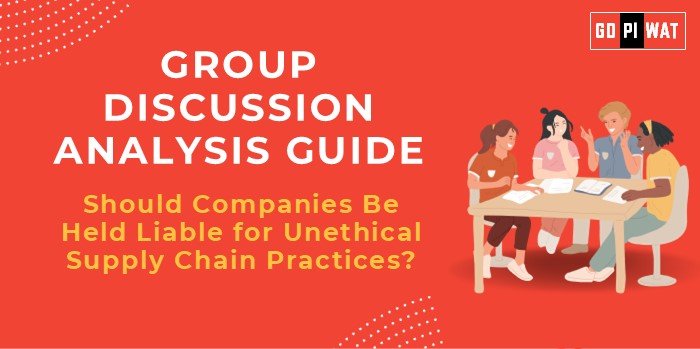📋 Should Companies Be Held Liable for Unethical Supply Chain Practices?
🌐 Group Discussion Analysis Guide
🔍 Introduction to Unethical Supply Chain Practices and Corporate Liability
In an interconnected global economy, unethical supply chain practices—ranging from child labor to environmental damage—have put businesses under increasing scrutiny. The debate on corporate accountability raises questions about moral responsibility, regulatory frameworks, and sustainable business operations.
The 2013 Rana Plaza tragedy in Bangladesh, where over 1,100 garment workers died due to unsafe conditions, sparked global calls for holding companies accountable for their supply chain ethics. Today, regulations like Germany’s Supply Chain Act and growing consumer awareness have amplified this issue globally.
📊 Quick Facts and Key Statistics
- 🌍 Global Supply Chains: Over 80% of global trade is conducted through supply chains (World Trade Organization, 2023).
- 👶 Child Labor: 160 million children are involved in child labor globally, with many supplying materials to major industries (UNICEF, 2023).
- 💰 Consumer Behavior: 70% of consumers are willing to pay more for ethically sourced products (Nielsen, 2023).
- ⚖️ Corporate Accountability: 62% of global executives believe unethical supply chains can damage brand reputation (Deloitte, 2022).
👥 Stakeholders and Their Roles
- 🏢 Companies: Must ensure ethical practices across suppliers to maintain brand trust and legal compliance.
- 🏛️ Governments: Create regulatory frameworks to ensure ethical supply chain operations.
- 🔧 Suppliers: Uphold ethical standards, but often face economic pressures that lead to malpractices.
- 🛍️ Consumers: Drive demand for ethical products and hold businesses accountable through purchasing behavior.
- 🤝 NGOs and Activists: Monitor supply chains and advocate for transparency and worker rights.
🏆 Achievements and Challenges
✨ Achievements
- 📈 Increased Transparency: Companies like Unilever and Patagonia disclose their supply chain practices to promote accountability.
- ⚖️ Regulations: Germany’s Supply Chain Act mandates businesses to identify and address supply chain violations.
- 🔍 Consumer Advocacy: Ethical sourcing has become a competitive advantage, influencing consumer choices.
⚠️ Challenges
- 🛠️ Lack of Oversight: Multinational supply chains make it difficult to monitor every stage of production.
- 💵 Economic Pressure: Suppliers in developing nations often cut corners to meet cost and deadline demands.
- 🪞 Greenwashing: Companies may claim ethical sourcing without genuine action, misleading stakeholders.
🌍 Global Comparisons
- 🇩🇪 Germany: The Supply Chain Due Diligence Act requires companies to assess and mitigate human rights violations.
- 🍎 Apple: Despite strong policies, Apple faced criticism for child labor in its cobalt mining supply chain.
📖 Case Study: The 2013 Rana Plaza disaster highlighted the devastating consequences of unethical supply chains, forcing reforms in corporate accountability.
📚 Structured Arguments for Discussion
- ✔️ Supporting Stance: “Companies must be held liable because they benefit financially from unethical supply chains while workers suffer exploitation.”
- ❌ Opposing Stance: “Holding companies fully liable is unfair, as they cannot monitor every supplier in a complex global supply chain.”
- ⚖️ Balanced Perspective: “While companies cannot monitor every supplier, they have a moral and legal responsibility to implement ethical frameworks and improve oversight.”
💡 Effective Discussion Approaches
- 🔢 Opening Approaches:
- “160 million children globally are engaged in labor, many of whom support supply chains for global corporations.”
- “The Rana Plaza disaster underscored how corporate negligence in supply chains can lead to devastating consequences.”
- 🛠️ Counter-Argument Handling: Acknowledge challenges like supplier independence and propose practical solutions such as third-party audits and digital tracking systems.
🔍 Strategic Analysis of Strengths and Weaknesses
- 🟢 Strengths: Promotes transparency, improves worker conditions, enhances brand reputation.
- 🔴 Weaknesses: High monitoring costs, supplier resistance, and logistical challenges in global supply chains.
- 🟡 Opportunities: Use technology like blockchain for traceability, collaborate with NGOs for oversight.
- 🔵 Threats: Economic pressures may incentivize unethical shortcuts; excessive regulation could hurt smaller businesses.
🎓 Connecting with B-School Applications
- 🔗 Real-World Applications: Ethical supply chains as a competitive advantage, crisis management in global operations, and stakeholder management strategies.
- ❓ Sample Interview Questions:
- “Should companies prioritize profitability over supply chain ethics?”
- “What measures can businesses take to ensure ethical sourcing without increasing costs?”
- 📖 Insights for B-School Students: Understanding ethical supply chains is essential for leadership roles in operations, sustainability, and risk management.


